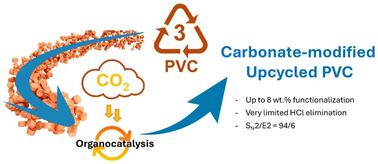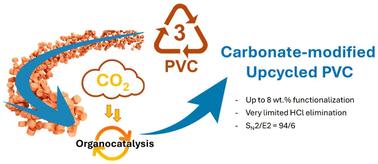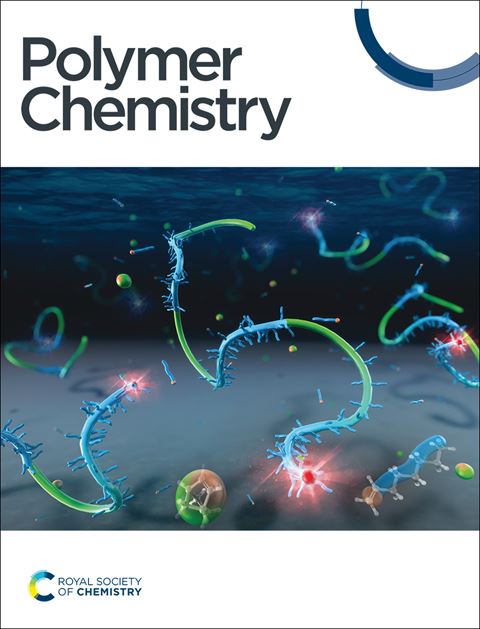二氧化碳结合醇作为聚氯乙烯升级回收的潜在候选者
IF 3.9
2区 化学
Q2 POLYMER SCIENCE
引用次数: 0
摘要
尽管聚氯乙烯(PVC)的全球产量不断增加,但其回收仍然是一个重大挑战,主要原因是其氯含量高,与传统回收工艺的兼容性有限。本研究探索了1,5,7-三氮杂环[4.4.0]十二-5-烯(TBD)基二氧化碳结合醇(CO2BALs)作为亲核试剂用于PVC功能化,旨在增强其升级回收潜力。系统考察了溶剂极性、CO2BAL转化率和反应时间对取代消除比的影响。虽然取代度仍低于10 wt%,但SN2/E2的选择性为94/6。利用1H NMR、FT-IR、SEC和TGA对功能化材料进行了表征,证实了碳酸盐基团的成功接枝,并突出了热稳定性趋势。虽然CO2BAL在极性溶剂中的稳定性可能会限制反应性,但目前正在考虑采用流动化学等替代方法来提高替代效率。这项工作为基于二氧化碳的PVC改性策略提供了新的见解,弥合了聚合物升级回收和可持续化学之间的差距。本文章由计算机程序翻译,如有差异,请以英文原文为准。


CO2-binding alcohols as potential candidates for poly(vinyl chloride) upcycling†
Despite the increasing global production of poly(vinyl chloride) (PVC), its recycling remains a major challenge, primarily due to its high chlorine content and limited compatibility with conventional recycling processes. This study explores the use of 1,5,7-triazabicyclo[4.4.0]dec-5-ene (TBD)-based CO2-binding alcohols (CO2BALs) as nucleophiles for PVC functionalization, aiming to enhance its upcycling potential. The impact of solvent polarity, CO2BAL conversion, and reaction time on the substitution-to-elimination ratio was systematically investigated. Although the degree of substitution remained below 10 wt%, a promising SN2/E2 selectivity of 94/6 was achieved. The functionalized materials were characterized using 1H NMR, FT-IR, SEC, and TGA, confirming the successful grafting of carbonate moieties and highlighting thermal stability trends. While CO2BAL stabilization in polar solvents may limit reactivity, alternative approaches, such as flow chemistry, are currently under consideration to improve substitution efficiency. This work provides new insights into CO2-based strategies for PVC modification, bridging the gap between polymer upcycling and sustainable chemistry.
求助全文
通过发布文献求助,成功后即可免费获取论文全文。
去求助
来源期刊

Polymer Chemistry
POLYMER SCIENCE-
CiteScore
8.60
自引率
8.70%
发文量
535
审稿时长
1.7 months
期刊介绍:
Polymer Chemistry welcomes submissions in all areas of polymer science that have a strong focus on macromolecular chemistry. Manuscripts may cover a broad range of fields, yet no direct application focus is required.
 求助内容:
求助内容: 应助结果提醒方式:
应助结果提醒方式:


